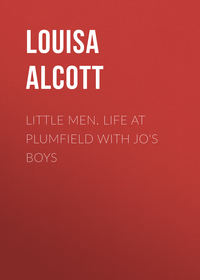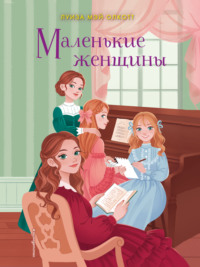 полная версия
полная версияLittle Women: or, Meg, Jo, Beth, and Amy
Meg likewise resolved to be "calm and kind, but firm," and show him his duty. She longed to run to meet him, and beg pardon, and be kissed and comforted, as she was sure of being; but, of course, she did nothing of the sort, and when she saw John coming, began to hum quite naturally, as she rocked and sewed, like a lady of leisure in her best parlor.
John was a little disappointed not to find a tender Niobe; but, feeling that his dignity demanded the first apology, he made none, only came leisurely in, and laid himself upon the sofa, with the singularly relevant remark, —
"We are going to have a new moon, my dear."
"I've no objection," was Meg's equally soothing remark.
A few other topics of general interest were introduced by Mr. Brooke, and wet-blanketed by Mrs. Brooke, and conversation languished. John went to one window, unfolded his paper, and wrapped himself in it, figuratively speaking. Meg went to the other window, and sewed as if new rosettes for her slippers were among the necessaries of life. Neither spoke; both looked quite "calm and firm," and both felt desperately uncomfortable.
"Oh dear," thought Meg, "married life is very trying, and does need infinite patience, as well as love, as mother says." The word "mother" suggested other maternal counsels, given long ago, and received with unbelieving protests.
"John is a good man, but he has his faults, and you must learn to see and bear with them, remembering your own. He is very decided, but never will be obstinate, if you reason kindly, not oppose impatiently. He is very accurate, and particular about the truth – a good trait, though you call him 'fussy.' Never deceive him by look or word, Meg, and he will give you the confidence you deserve, the support you need. He has a temper, not like ours, – one flash, and then all over, – but the white, still anger, that is seldom stirred, but once kindled, is hard to quench. Be careful, very careful, not to wake this anger against yourself, for peace and happiness depend on keeping his respect. Watch yourself, be the first to ask pardon if you both err, and guard against the little piques, misunderstandings, and hasty words that often pave the way for bitter sorrow and regret."
These words came back to Meg, as she sat sewing in the sunset, especially the last. This was the first serious disagreement; her own hasty speeches sounded both silly and unkind, as she recalled them, her own anger looked childish now, and thoughts of poor John coming home to such a scene quite melted her heart. She glanced at him with tears in her eyes, but he did not see them; she put down her work and got up, thinking, "I will be the first to say, 'Forgive me,'" but he did not seem to hear her; she went very slowly across the room, for pride was hard to swallow, and stood by him, but he did not turn his head. For a minute she felt as if she really couldn't do it; then came the thought, "This is the beginning, I'll do my part, and have nothing to reproach myself with," and stooping down, she softly kissed her husband on the forehead. Of course that settled it; the penitent kiss was better than a world of words, and John had her on his knee in a minute, saying tenderly, —
"It was too bad to laugh at the poor little jelly-pots. Forgive me, dear, I never will again!"
But he did, oh bless you, yes, hundreds of times, and so did Meg, both declaring that it was the sweetest jelly they ever made; for family peace was preserved in that little family jar.
After this, Meg had Mr. Scott to dinner by special invitation, and served him up a pleasant feast without a cooked wife for the first course; on which occasion she was so gay and gracious, and made everything go off so charmingly, that Mr. Scott told John he was a happy fellow, and shook his head over the hardships of bachelorhood all the way home.
In the autumn, new trials and experiences came to Meg. Sallie Moffat renewed her friendship, was always running out for a dish of gossip at the little house, or inviting "that poor dear" to come in and spend the day at the big house. It was pleasant, for in dull weather Meg often felt lonely; all were busy at home, John absent till night, and nothing to do but sew, or read, or potter about. So it naturally fell out that Meg got into the way of gadding and gossiping with her friend. Seeing Sallie's pretty things made her long for such, and pity herself because she had not got them. Sallie was very kind, and often offered her the coveted trifles; but Meg declined them, knowing that John wouldn't like it; and then this foolish little woman went and did what John disliked infinitely worse.
She knew her husband's income, and she loved to feel that he trusted her, not only with his happiness, but what some men seem to value more, – his money. She knew where it was, was free to take what she liked, and all he asked was that she should keep account of every penny, pay bills once a month, and remember that she was a poor man's wife. Till now, she had done well, been prudent and exact, kept her little account-books neatly, and showed them to him monthly without fear. But that autumn the serpent got into Meg's paradise, and tempted her, like many a modern Eve, not with apples, but with dress. Meg didn't like to be pitied and made to feel poor; it irritated her, but she was ashamed to confess it, and now and then she tried to console herself by buying something pretty, so that Sallie needn't think she had to economize. She always felt wicked after it, for the pretty things were seldom necessaries; but then they cost so little, it wasn't worth worrying about; so the trifles increased unconsciously, and in the shopping excursions she was no longer a passive looker-on.
But the trifles cost more than one would imagine; and when she cast up her accounts at the end of the month, the sum total rather scared her. John was busy that month, and left the bills to her; the next month he was absent; but the third he had a grand quarterly settling up, and Meg never forgot it. A few days before she had done a dreadful thing, and it weighed upon her conscience. Sallie had been buying silks, and Meg longed for a new one, – just a handsome light one for parties, her black silk was so common, and thin things for evening wear were only proper for girls. Aunt March usually gave the sisters a present of twenty-five dollars apiece at New Year; that was only a month to wait, and here was a lovely violet silk going at a bargain, and she had the money, if she only dared to take it. John always said what was his was hers; but would he think it right to spend not only the prospective five-and-twenty, but another five-and-twenty out of the household fund? That was the question. Sallie had urged her to do it, had offered to loan the money, and with the best intentions in life, had tempted Meg beyond her strength. In an evil moment the shopman held up the lovely, shimmering folds, and said, "A bargain, I assure you, ma'am." She answered, "I'll take it;" and it was cut off and paid for, and Sallie had exulted, and she had laughed as if it were a thing of no consequence, and driven away, feeling as if she had stolen something, and the police were after her.
When she got home, she tried to assuage the pangs of remorse by spreading forth the lovely silk; but it looked less silvery now, didn't become her, after all, and the words "fifty dollars" seemed stamped like a pattern down each breadth. She put it away; but it haunted her, not delightfully, as a new dress should, but dreadfully, like the ghost of a folly that was not easily laid. When John got out his books that night, Meg's heart sank, and for the first time in her married life, she was afraid of her husband. The kind, brown eyes looked as if they could be stern; and though he was unusually merry, she fancied he had found her out, but didn't mean to let her know it. The house-bills were all paid, the books all in order. John had praised her, and was undoing the old pocket-book which they called the "bank," when Meg, knowing that it was quite empty, stopped his hand, saying nervously, —
"You haven't seen my private expense book yet."
John never asked to see it; but she always insisted on his doing so, and used to enjoy his masculine amazement at the queer things women wanted, and made him guess what "piping" was, demand fiercely the meaning of a "hug-me-tight," or wonder how a little thing composed of three rosebuds, a bit of velvet, and a pair of strings, could possibly be a bonnet, and cost five or six dollars. That night he looked as if he would like the fun of quizzing her figures and pretending to be horrified at her extravagance, as he often did, being particularly proud of his prudent wife.
The little book was brought slowly out, and laid down before him. Meg got behind his chair under pretence of smoothing the wrinkles out of his tired forehead, and standing there, she said, with her panic increasing with every word, —
"John, dear, I'm ashamed to show you my book, for I've really been dreadfully extravagant lately. I go about so much I must have things, you know, and Sallie advised my getting it, so I did; and my New-Year's money will partly pay for it: but I was sorry after I'd done it, for I knew you'd think it wrong in me."
John laughed, and drew her round beside him, saying good-humoredly, "Don't go and hide. I won't beat you if you have got a pair of killing boots; I'm rather proud of my wife's feet, and don't mind if she does pay eight or nine dollars for her boots, if they are good ones."
That had been one of her last "trifles," and John's eye had fallen on it as he spoke. "Oh, what will he say when he comes to that awful fifty dollars!" thought Meg, with a shiver.
"It's worse than boots, it's a silk dress," she said, with the calmness of desperation, for she wanted the worst over.
"Well, dear, what is the 'dem'd total,' as Mr. Mantalini says?"
That didn't sound like John, and she knew he was looking up at her with the straightforward look that she had always been ready to meet and answer with one as frank till now. She turned the page and her head at the same time, pointing to the sum which would have been bad enough without the fifty, but which was appalling to her with that added. For a minute the room was very still; then John said slowly, – but she could feel it cost him an effort to express no displeasure, —
"Well, I don't know that fifty is much for a dress, with all the furbelows and notions you have to have to finish it off these days."
"It isn't made or trimmed," sighed Meg faintly, for a sudden recollection of the cost still to be incurred quite overwhelmed her.
"Twenty-five yards of silk seems a good deal to cover one small woman, but I've no doubt my wife will look as fine as Ned Moffat's when she gets it on," said John dryly.
"I know you are angry, John, but I can't help it. I don't mean to waste your money, and I didn't think those little things would count up so. I can't resist them when I see Sallie buying all she wants, and pitying me because I don't. I try to be contented, but it is hard, and I'm tired of being poor."
The last words were spoken so low she thought he did not hear them, but he did, and they wounded him deeply, for he had denied himself many pleasures for Meg's sake. She could have bitten her tongue out the minute she had said it, for John pushed the books away, and got up, saying, with a little quiver in his voice, "I was afraid of this; I do my best, Meg." If he had scolded her, or even shaken her, it would not have broken her heart like those few words. She ran to him and held him close, crying, with repentant tears, "O John, my dear, kind, hard-working boy, I didn't mean it! It was so wicked, so untrue and ungrateful, how could I say it! Oh, how could I say it!"
He was very kind, forgave her readily, and did not utter one reproach; but Meg knew that she had done and said a thing which would not be forgotten soon, although he might never allude to it again. She had promised to love him for better for worse; and then she, his wife, had reproached him with his poverty, after spending his earnings recklessly. It was dreadful; and the worst of it was John went on so quietly afterward, just as if nothing had happened, except that he stayed in town later, and worked at night when she had gone to cry herself to sleep. A week of remorse nearly made Meg sick; and the discovery that John had countermanded the order for his new great-coat reduced her to a state of despair which was pathetic to behold. He had simply said, in answer to her surprised inquiries as to the change, "I can't afford it, my dear."
Meg said no more, but a few minutes after he found her in the hall, with her face buried in the old great-coat, crying as if her heart would break.
They had a long talk that night, and Meg learned to love her husband better for his poverty, because it seemed to have made a man of him, given him the strength and courage to fight his own way, and taught him a tender patience with which to bear and comfort the natural longings and failures of those he loved.
Next day she put her pride in her pocket, went to Sallie, told the truth, and asked her to buy the silk as a favor. The good-natured Mrs. Moffat willingly did so, and had the delicacy not to make her a present of it immediately afterward. Then Meg ordered home the great-coat, and, when John arrived, she put it on, and asked him how he liked her new silk gown. One can imagine what answer he made, how he received his present, and what a blissful state of things ensued. John came home early, Meg gadded no more; and that great-coat was put on in the morning by a very happy husband, and taken off at night by a most devoted little wife. So the year rolled round, and at midsummer there came to Meg a new experience, – the deepest and tenderest of a woman's life.
Laurie came sneaking into the kitchen of the Dove-cote, one Saturday, with an excited face, and was received with the clash of cymbals; for Hannah clapped her hands with a saucepan in one and the cover in the other.
"How's the little mamma? Where is everybody? Why didn't you tell me before I came home?" began Laurie, in a loud whisper.
"Happy as a queen, the dear! Every soul of 'em is upstairs a worshipin'; we didn't want no hurrycanes round. Now you go into the parlor, and I'll send 'em down to you," with which somewhat involved reply Hannah vanished, chuckling ecstatically.
Presently Jo appeared, proudly bearing a flannel bundle laid forth upon a large pillow. Jo's face was very sober, but her eyes twinkled, and there was an odd sound in her voice of repressed emotion of some sort.
"Shut your eyes and hold out your arms," she said invitingly.
Laurie backed precipitately into a corner, and put his hands behind him with an imploring gesture: "No, thank you, I'd rather not. I shall drop it or smash it, as sure as fate."
"Then you sha'n't see your nevvy," said Jo decidedly, turning as if to go.
"I will, I will! only you must be responsible for damages;" and, obeying orders, Laurie heroically shut his eyes while something was put into his arms. A peal of laughter from Jo, Amy, Mrs. March, Hannah, and John caused him to open them the next minute, to find himself invested with two babies instead of one.
No wonder they laughed, for the expression of his face was droll enough to convulse a Quaker, as he stood and stared wildly from the unconscious innocents to the hilarious spectators, with such dismay that Jo sat down on the floor and screamed.
"Twins, by Jupiter!" was all he said for a minute; then, turning to the women with an appealing look that was comically piteous, he added, "Take 'em quick, somebody! I'm going to laugh, and I shall drop 'em."
John rescued his babies, and marched up and down, with one on each arm, as if already initiated into the mysteries of baby-tending, while Laurie laughed till the tears ran down his cheeks.
"It's the best joke of the season, isn't it? I wouldn't have you told, for I set my heart on surprising you, and I flatter myself I've done it," said Jo, when she got her breath.
"I never was more staggered in my life. Isn't it fun? Are they boys? What are you going to name them? Let's have another look. Hold me up, Jo; for upon my life it's one too many for me," returned Laurie, regarding the infants with the air of a big, benevolent Newfoundland looking at a pair of infantile kittens.
"Boy and girl. Aren't they beauties?" said the proud papa, beaming upon the little, red squirmers as if they were unfledged angels.
"Most remarkable children I ever saw. Which is which?" and Laurie bent like a well-sweep to examine the prodigies.
"Amy put a blue ribbon on the boy and a pink on the girl, French fashion, so you can always tell. Besides, one has blue eyes and one brown. Kiss them, Uncle Teddy," said wicked Jo.
"I'm afraid they mightn't like it," began Laurie, with unusual timidity in such matters.
"Of course they will; they are used to it now. Do it this minute, sir!" commanded Jo, fearing he might propose a proxy.
Laurie screwed up his face, and obeyed with a gingerly peck at each little cheek that produced another laugh, and made the babies squeal.
"There, I knew they didn't like it! That's the boy; see him kick; he hits out with his fists like a good one. Now then, young Brooke, pitch into a man of your own size, will you?" cried Laurie, delighted with a poke in the face from a tiny fist, flapping aimlessly about.
"He's to be named John Laurence, and the girl Margaret, after mother and grandmother. We shall call her Daisy, so as not to have two Megs, and I suppose the mannie will be Jack, unless we find a better name," said Amy, with aunt-like interest.
"Name him Demijohn, and call him 'Demi' for short," said Laurie.
"Daisy and Demi, – just the thing! I knew Teddy would do it," cried Jo, clapping her hands.
Teddy certainly had done it that time, for the babies were "Daisy" and "Demi" to the end of the chapter.
XXIX
CALLS
"COME, Jo, it's time."
"For what?"
"You don't mean to say you have forgotten that you promised to make half a dozen calls with me to-day?"
"I've done a good many rash and foolish things in my life, but I don't think I ever was mad enough to say I'd make six calls in one day, when a single one upsets me for a week."
"Yes, you did; it was a bargain between us. I was to finish the crayon of Beth for you, and you were to go properly with me, and return our neighbors' visits."
"If it was fair – that was in the bond; and I stand to the letter of my bond, Shylock. There is a pile of clouds in the east; it's not fair, and I don't go."
"Now, that's shirking. It's a lovely day, no prospect of rain, and you pride yourself on keeping promises; so be honorable; come and do your duty, and then be at peace for another six months."
At that minute Jo was particularly absorbed in dressmaking; for she was mantua-maker general to the family, and took especial credit to herself because she could use a needle as well as a pen. It was very provoking to be arrested in the act of a first trying-on, and ordered out to make calls in her best array, on a warm July day. She hated calls of the formal sort, and never made any till Amy compelled her with a bargain, bribe, or promise. In the present instance, there was no escape; and having clashed her scissors rebelliously, while protesting that she smelt thunder, she gave in, put away her work, and taking up her hat and gloves with an air of resignation, told Amy the victim was ready.
"Jo March, you are perverse enough to provoke a saint! You don't intend to make calls in that state, I hope," cried Amy, surveying her with amazement.
"Why not? I'm neat and cool and comfortable; quite proper for a dusty walk on a warm day. If people care more for my clothes than they do for me, I don't wish to see them. You can dress for both, and be as elegant as you please: it pays for you to be fine; it doesn't for me, and furbelows only worry me."
"Oh dear!" sighed Amy; "now she's in a contrary fit, and will drive me distracted before I can get her properly ready. I'm sure it's no pleasure to me to go to-day, but it's a debt we owe society, and there's no one to pay it but you and me. I'll do anything for you, Jo, if you'll only dress yourself nicely, and come and help me do the civil. You can talk so well, look so aristocratic in your best things, and behave so beautifully, if you try, that I'm proud of you. I'm afraid to go alone; do come and take care of me."
"You're an artful little puss to flatter and wheedle your cross old sister in that way. The idea of my being aristocratic and well-bred, and your being afraid to go anywhere alone! I don't know which is the most absurd. Well, I'll go if I must, and do my best. You shall be commander of the expedition, and I'll obey blindly; will that satisfy you?" said Jo, with a sudden change from perversity to lamb-like submission.
"You're a perfect cherub! Now put on all your best things, and I'll tell you how to behave at each place, so that you will make a good impression. I want people to like you, and they would if you'd only try to be a little more agreeable. Do your hair the pretty way, and put the pink rose in your bonnet; it's becoming, and you look too sober in your plain suit. Take your light gloves and the embroidered handkerchief. We'll stop at Meg's, and borrow her white sunshade, and then you can have my dove-colored one."
While Amy dressed, she issued her orders, and Jo obeyed them; not without entering her protest, however, for she sighed as she rustled into her new organdie, frowned darkly at herself as she tied her bonnet strings in an irreproachable bow, wrestled viciously with pins as she put on her collar, wrinkled up her features generally as she shook out the handkerchief, whose embroidery was as irritating to her nose as the present mission was to her feelings; and when she had squeezed her hands into tight gloves with three buttons and a tassel, as the last touch of elegance, she turned to Amy with an imbecile expression of countenance, saying meekly, —
"I'm perfectly miserable; but if you consider me presentable, I die happy."
"You are highly satisfactory; turn slowly round, and let me get a careful view." Jo revolved, and Amy gave a touch here and there, then fell back, with her head on one side, observing graciously, "Yes, you'll do; your head is all I could ask, for that white bonnet with the rose is quite ravishing. Hold back your shoulders, and carry your hands easily, no matter if your gloves do pinch. There's one thing you can do well, Jo, that is, wear a shawl – I can't; but it's very nice to see you, and I'm so glad Aunt March gave you that lovely one; it's simple, but handsome, and those folds over the arm are really artistic. Is the point of my mantle in the middle, and have I looped my dress evenly? I like to show my boots, for my feet are pretty, though my nose isn't."
"You are a thing of beauty and a joy forever," said Jo, looking through her hand with the air of a connoisseur at the blue feather against the gold hair. "Am I to drag my best dress through the dust, or loop it up, please, ma'am?"
"Hold it up when you walk, but drop it in the house; the sweeping style suits you best, and you must learn to trail your skirts gracefully. You haven't half buttoned one cuff; do it at once. You'll never look finished if you are not careful about the little details, for they make up the pleasing whole."
Jo sighed, and proceeded to burst the buttons off her glove, in doing up her cuff; but at last both were ready, and sailed away, looking as "pretty as picters," Hannah said, as she hung out of the upper window to watch them.
"Now, Jo dear, the Chesters consider themselves very elegant people, so I want you to put on your best deportment. Don't make any of your abrupt remarks, or do anything odd, will you? Just be calm, cool, and quiet, – that's safe and ladylike; and you can easily do it for fifteen minutes," said Amy, as they approached the first place, having borrowed the white parasol and been inspected by Meg, with a baby on each arm.
"Let me see. 'Calm, cool, and quiet,' – yes, I think I can promise that. I've played the part of a prim young lady on the stage, and I'll try it off. My powers are great, as you shall see; so be easy in your mind, my child."
Amy looked relieved, but naughty Jo took her at her word; for, during the first call, she sat with every limb gracefully composed, every fold correctly draped, calm as a summer sea, cool as a snowbank, and as silent as a sphinx. In vain Mrs. Chester alluded to her "charming novel," and the Misses Chester introduced parties, picnics, the opera, and the fashions; each and all were answered by a smile, a bow, and a demure "Yes" or "No," with the chill on. In vain Amy telegraphed the word "Talk," tried to draw her out, and administered covert pokes with her foot. Jo sat as if blandly unconscious of it all, with deportment like Maud's face, "icily regular, splendidly null."









